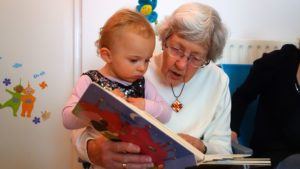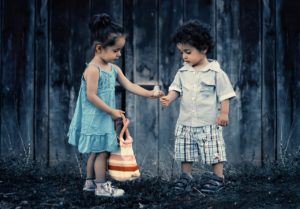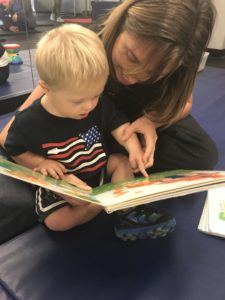preschool
Help your child be comfortable separating from mom and dad: Expose your child to other people early on and consistently. Have grandparents, good friends, babysitters/daycare providers watch your child even for a short time of the day. It’s healthy for babies/toddlers to go through some separation anxiety as this tells you that they recognize mom and dad. However, the exposure to trusting other adults and being comfortable without mom and dad helps your child build confidence and trust in various environments and with and without their parents present.

Following another adult’s directions: Teaching your child that they need to listen to you and other adults will help them learn to respect others and will help them to know to listen to their teacher and follow through with assignments as they get older. Following directions will be a big part of their school day; “throw your tissue away, put the crayons in the cup, put your coat on” these will all be frequent directions they will hear and need to follow.
Sitting in a group for Circle Time: In Circle Time, children will be expected to sit, listen to a book, talk about the weather and the day of the week. Parents can prepare their child for this by reading aloud and talking with them about the day so they have practice listening and engaging in conversations.
Working in small groups at Centers: Staying at a Center for 5-10 minutes will take some attention span and working next to their peers will take some parallel play, turn taking and sharing. You can model these behaviors when you play with your child! If you have friends with children about the same age you can set up a play date so they can practice these skills with peers they already know. The more children play, the more creativity and problem solving they will develop.
Being respectful of others: Demonstrating how to treat and talk to others will help your child learn how to be respectful of others and how others should treat them in return.
Learning to get along with peers: Until they are 3 1/2 years old, children will participate in parallel play where they play near each other. Associative play occurs until 4 1/2 when they trade and share toys. At home, you can practice trading, sharing, taking turns with games, pretend play and simple toys.
Learning numbers, counting, letters, recognize their name, shapes, colors: Using books and toys, you can talk to your child about colors, shapes and counting, “Let’s count how many bunnies are on the page!” When playing with toys, talk about the color the toy is, “we’re throwing the red ball!” In the car, listen to the Alphabet Song and songs about counting to make learning fun. Have magnetic letters on the refrigerator, put their name up in their room! When helping your child get dressed, talk about the color shirt/pants they have on, the more you build these facts into their daily vocabulary, the more these skills will come naturally.
Social emotional skills: Talk about feelings, express feelings and demonstrate how to handle frustrations in a healthy way. Setting consistent limits and rules will help kids learn what is expected. Teaching empathy will allow your child to be a good friend to others as well. Recognizing their feelings and guiding them through handling their emotions will minimize meltdowns and help them handle frustrations in a healthy way.
If your child needs help with any of the above skills to be ready for preschool, we want to help! Go to https://www.abcpediatrictherapy.com for more tips on how to help your child.
Read More Skip to content
Skip to content
